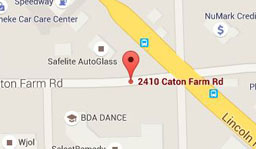What You Should Know About Fluoridated Water
 Fluoride is probably in your toothpaste. It may be in your mouth rinse, and your dentist probably recommends regular treatments for your children. Fluoride is everywhere when you look at dental health. And it may even be in your water.
Fluoride is probably in your toothpaste. It may be in your mouth rinse, and your dentist probably recommends regular treatments for your children. Fluoride is everywhere when you look at dental health. And it may even be in your water.
Many cities and other areas in the United States add fluoride to their water supplies, but many people aren’t sure what fluoride really is, why it’s added, and how safe it actually is.
What Is Fluoride and What Are the Benefits?
Fluoride is a mineral found naturally in your teeth and bones. It helps strengthen the enamel, which is the outer layer on your teeth that makes it harder for cavity-causing bacteria to attack your teeth. Fluoride is helpful for your dental health, even if you already have signs of decay, because it helps rebuild weak enamel and can reverse early tooth decay.
Is Fluoridated Water Safe?
Fluoridated water is many people’s main source of fluoride. It’s considered a public health measure that is a cost-effective way to prevent cavities in the population. Some people are concerned about the safety of fluoridated water. However, there isn’t any strong evidence that fluoridated water in the United States causes any major health problems.
Some smaller studies have shown possible links between fluoride and low IQ scores in children, arthritis, kidney disease, and bone cancer. These studies don’t show a definitive link, and scientists would need to replicate the studies to show a link.
While too much fluoride can lead to problems, the level of fluoride in public fluoridated water supplies is not toxic.
Is Your Water Fluoridated and What Should You Do If It Isn’t?
You can ask your dentist if your local water supply has fluoride in it. The CDC’s website also has a tool where you can check the fluoride levels if you live in Illinois or another participating state.
If your city doesn’t have fluoridated water and you’re concerned about getting enough fluoride, check to make sure your toothpaste and mouthwash contain fluoride. Once your children can reliably spit out toothpaste and mouth rinses, they can use fluoridated products too.
If you need additional fluoride, your dentist might recommend taking a fluoride supplement or giving one to your child. Your dentist might also recommend professional fluoride treatments if your water doesn’t have fluoride in it. These treatments are done in the dentist’s office. Your dentist will use a swab or a disposable tray to apply concentrated fluoride gel or foam to your teeth. Dentists can perform professional fluoride treatments as often as every three months in both children and adults.
What Happens If You Get Too Much Fluoride?
Excessive fluoride intake can lead to a condition called fluorosis. Dental fluorosis occurs in children who take in too much fluoride while their teeth are still forming under the gums. The condition is a cosmetic one — it doesn’t cause any real harm to the teeth, but it does cause unsightly white spots on the teeth.
This risk is why most dentists suggest using fluoride-free toothpaste for children three and under and only using a very tiny amount of toothpaste with fluoride in it for children under six and children of any age who are still learning to spit the toothpaste out effectively.
If you have long-term exposure to very high fluoride levels, you could develop skeletal fluorosis, which is a condition that affects the bones and joints. It causes stiffness and pain and can change bone structure over time. This condition is often seen in parts of Africa and Asia that have large natural fluoride deposits that contaminate the water. Luckily, skeletal fluorosis is very rare in the United States, even in areas that have fluoridated water.
Crest Hill Family Dental serves patients of all ages in Crest Hill and the surrounding areas. If you’re due to see the dentist or have a tooth that’s been bothering you, contact us today to schedule an appointment.

